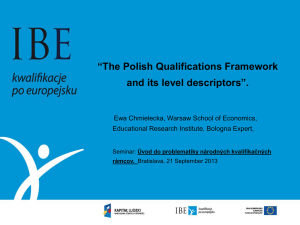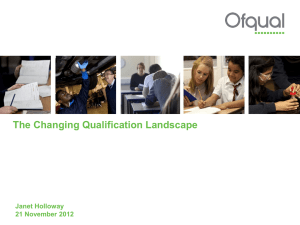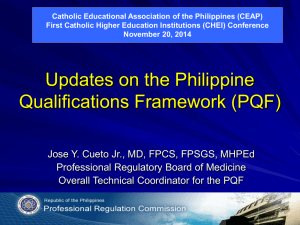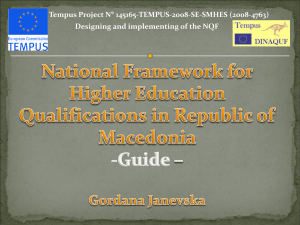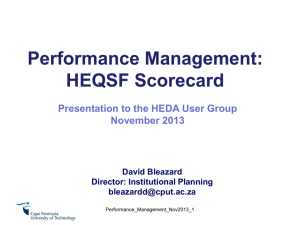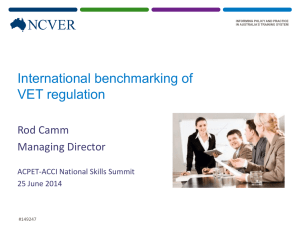ASEAN MRA Qualifications Framework
advertisement
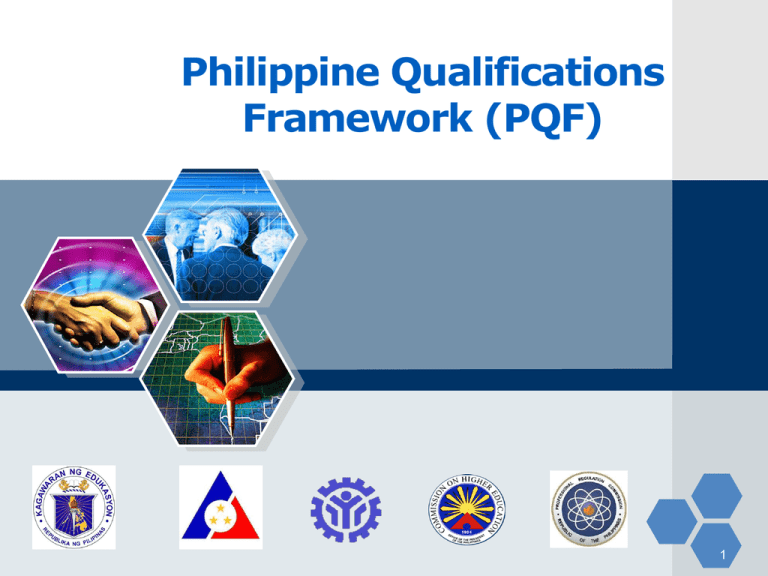
LOGO Philippine Qualifications Framework (PQF) 1 Outline of Presentation What is PQF? Objectives of the PQF Benefits of the PQF The Development of the PQF The PQF vis-à-vis the Education System The 8-Level Descriptors PQF Implementing Bodies PQF Working Groups Some Notes 2 THE PHL QUALIFICATIONS FRAMEWORK (Approved by the NEDA SDC-Cabinet on May 18, 2012) BASIC ED TESD HIGHER EDUCATION L8 DOCTORAL AND POST DOCTORAL L7 POST BACCALAUREATE L6 BACCALAUREATE L5 DIPLOMA L4 NC IV L3 NC III L2 G12 L1 10 NC II NC I 3 From the President’s SONA 2011 “… ngayon pa lang, nagtatagpo na ang kaisipan ng DOLE, CHED, TESDA at DepEd upang tugunan and isyu ng job mismatch. Susuriin ang mga curriculum para maituon sa mga industriyang naghahanap ng empleyado, at gagabayan ang mga estudyante sa pagpili ng mga kursong hitik sa bakanteng trabaho.” 4 What is a Qualification? Package of competencies describing a particular function or job role existing in an economic sector. It covers the work activities required to undertake a particular job role. What is PQF? It is a national policy describing the levels of educational qualifications and sets the standards for qualification outcomes. A quality assured national system for the development, recognition and award of qualifications based on standards of knowledge, skills and values acquired in different ways and methods by learners and workers of a certain country It is competency-based and labor market driven. It is assessment- based qualification recognition. 6 Objectives of the PQF To establish national standards and levels for outcomes of education and training, skills and competencies To support the development and maintenance of pathways and equivalencies which provide access to qualifications and assist people to move easily and readily between the different E & T sectors and between these sectors and the labour market To align the PQF with international qualifications framework to support the national and international mobility of workers thru increased recognition of the value and comparability of Philippine qualifications 7 Benefits of the PQF FOR THE PERSON Encourages lifelong learning allowing the person to start at the level that suits him and then build-up his qualifications as his needs and interests develop and change over time Certificates and licenses recognized by government FOR THE EMPLOYERS Assures that standards and qualifications are consistent to job requirements/demand Provides common understanding on standards, qualifications and levels 8 Benefits of the PQF FOR THE EDUCATION & TRAINING PROVIDERS Ensures transparency in training provision, conformance to standards and preciseness of accountability for learning outcomes Provides common understanding of policies and guidelines on credit transfers, articulation, portability, bridges pathways and RPL FOR THE AUTHORITIES Provides the standards, taxonomy and typology of qualifications as bases for granting approvals to providers and stakeholders Harmonizes qualifications in E & T across Philippines 9 The Development of PQF INPUTS OUTPUTS Industry needs Qualification Levels Need for global recognition of competencies Descriptors Current qualifications issues at all levels Qualifications issues in recognition of prior learning Registers Philippine Qualifications Framework Working Groups Pathways & Equivalencies Quality Assurance Research and policy papers on NQF Information & Guidelines NQFs of other countries International Alignment Consultation and Advocacy With Stakeholders 10 The Philippine Education System Six (6) Years One (1) Year Four (4) Years Junior HS + Two (2) Years Senior HS + TESD Specialization (NC I and NC II) + Arts & Sports Technical Education and Skills Development Baccalaureate, Post- Baccalaureate, Post-Doctoral/ Specialization 11 THE PHL QUALIFICATIONS FRAMEWORK (Approved by the NEDA SDC-Cabinet on May 18, 2012) BASIC ED TESD HIGHER EDUCATION L8 DOCTORAL AND POST DOCTORAL L7 POST BACCALAUREATE L6 BACCALAUREATE L5 DIPLOMA L4 NC IV L3 NC III L2 G12 L1 10 NC II NC I 12 8-Level Descriptors 13 LEVEL 1 KNOWLEDGE, SKILLS Knowledge and skills that are manual AND VALUES or concrete or practical and/or operational in focus. APPLICATION DEGREE OF INDEPENDENCE QUALIFICATION TYPE Applied in activities that are set in a limited range of highly familiar and predictable contexts; involve straightforward, routine issues which are addressed by following set rules, guidelines or procedures. In conditions where there is very close support, guidance or supervision; minimum judgment or discretion is needed. NATIONAL CERTIFICATE I 14 LEVEL 2 KNOWLEDGE, SKILLS Knowledge and skills that are manual, AND VALUES practical and/or operational in focus with a variety of options. APPLICATION Applied in activities that are set in a range of familiar and predictable contexts; involve routine issues which are identified and addressed by selecting from and following a number of set rules, guidelines or procedures. DEGREE OF INDEPENDENCE In conditions where there is substantial support, guidance or supervision; limited judgment or discretion is needed. QUALIFICATION TYPE NATIONAL CERTIFICATE II 15 LEVEL 3 KNOWLEDGE, SKILLS AND VALUES Knowledge and skills are a balance of theoretical and practical. Work involves understanding work process, contributing to problem solving and making decisions to determine process, equipment and materials to be used. APPLICATION Applied in activities that are set in contexts with some unfamiliar or unpredictable aspects; involve routine and non-routine issues which are identified and addressed by interpreting and applying established guidelines or procedures with some variations. DEGREE OF INDEPENDENCE Application may involve individual responsibility or autonomy, may involve some responsibility for others. Participation in teams including team or group coordination may be involved. QUALIFICATION TYPE NATIONAL CERTIFICATE III 16 LEVEL 4 KNOWLEDGE, SKILLS AND VALUES Knowledge and skills are mainly theoretical and/or abstract with significant depth in one or more areas; contributing to technical solutions of a non-routine or contingency nature; evaluation and analysis of current practices and the development of new criteria and procedures. APPLICATION Applied in activities that are set in range of contexts, most of which involve a number of unfamiliar and/or unpredictable aspects; involve largely non-routine issues which are addressed using guidelines or procedures which require interpretation and/or adaptation. Work involves some leadership and guidance when DEGREE OF INDEPENDENCE organizing activities of self and others QUALIFICATIO N TYPE NATIONAL CERTIFICATE IV 17 LEVEL 5 KNOWLEDGE, SKILLS AND VALUES Knowledge and skills that are mainly theoretical and/or abstract with significant depth in some areas together with wide-ranging, specialized technical, creative and conceptual skills. Perform work activities demonstrating breadth, depth and complexity in the planning and initiation of alternative approaches to skills and knowledge applications across a broad range of technical and/or management requirements, evaluation and coordination. APPLICATION Applied in activities that are supervisory, complex and non-routine which require an extensive interpretation and/or adaptation/ innovation. DEGREE OF In conditions where there is broad guidance and INDEPENDENCE direction, where judgment is required in planning and selecting appropriate equipment, services and techniques for self and others. Undertake work involving participation in the development of strategic initiatives, as well as personal responsibility and autonomy in performing complex technical operations or organizing others QUALIFICATION DIPLOMA 18 LEVEL 6 KNOWLEDGE, SKILLS AND VALUES Graduates at this level have broad and coherent knowledge and skills in their field of study for professional work and lifelong learning APPLICATION Application in professional work or research in a specialized field of discipline and/or for further study DEGREE OF INDEPENDENCE QUALIFICATION TYPE Independent and /or in teams of related field with minimal supervision Baccalaureate Degree 19 LEVEL KNOWLEDGE, SKILLS AND VALUES APPLICATION DEGREE OF INDEPENDENCE QUALIFICATION TYPE 7 Graduates at this level have advanced knowledge and skills in specialized or multidisciplinary field of study for professional practice or self-directed research Applied in professional work that requires leadership and management in a specialized or multidisciplinary professional work, research and/or for further study Independent and or in teams of multidisciplinary field with very minimal supervision Post-Baccalaureate Program 20 LEVEL 8 KNOWLEDGE, SKILLS AND VALUES Graduates at this level have highly advanced systematic knowledge and skills in very specialized or complex multidisciplinary field of learning for multifaceted research or professional practice or for the advancement of learning APPLICATION Applied in highly specialized or complex multidisciplinary field of professional work, research and/or further study that require management expertise, innovation and leadership DEGREE OF INDEPENDENCE QUALIFICATION TYPE Independent and/or in teams of multidisciplinary and complex setting Doctoral Degree and Post-Doctoral Programs 21 PQF Implementing Bodies 22 PQF-NCC The PQF National Coordinating Committee is hereby created to be Chaired by the Secretary of the Department of Education (DepEd) with the following as members: a) Technical Education and Skills Development Authority (TESDA); b) Commission on Higher Education (CHED); c) Department of Labor and Employment (DOLE); and, d) Professional Regulations Commission (PRC). (Sec. 2, EO No. 83 s.2012) 23 Powers & Functions of the PQFNCC 1. Creates technical working groups in support of the detailing and implementation of the PQF 2. Harmonizes the levels of qualifications with all levels of education 3. Aligns education standards and learning outcomes to the level descriptors contained herein 4. Develops and recognizes pathways and equivalencies 5. Discuss and agree on the elements of the PQF including but not limited to their principles, key features, definitions or terminologies, structure and governance arrangements 6. Review and update the PQF 24 Powers & Functions of the PQFNCC 7. Provides information and guidelines in the implementation of the PQF 8. Establishes a quality assurance mechanism 9. Maintains the national registry of qualified manpower 10. Ensures the international alignment of the PQF with the qualification frameworks of other countries. 11. Represents the country in international fora or negotiations on qualification agreements/arrangements 12. Provides regular feedback on the progress and accomplishments to the Office of the President with respect to the implementation of the Order. 13. Perform such other functions that may be related to the implementation of the PQF 25 Technical Secretariat FUNCTIONS 1. Provide technical and administrative support to the Committee; 2. Engage the services of technical experts; and 3. Perform such other functions as the Committee may deem necessary. Chair: DDG Irene Isaac, TESDA 26 PQF Working Groups 27 Qualifications Register FUNCTIONS 1. Provides information to employers, trainers and trainees on education and training opportunities, licensure and assessment and certification services in professional and skilled qualifications; 2. Maintains/updates the database of professional and skilled qualifications; 3. Provides regular, timely data/information to the Technical Secretariat; 4. Coordinates/Harmonizes agency databases on the registry of qualifications LEAD AGENCY: TESDA 28 Pathways and Equivalencies FUNCTIONS 1. Establishes equivalency pathways and equivalency system for seamless education transfer and/or progression between education levels corresponding to the PQF levels; 2. Develops a National System of Credit Transfer; 3. Facilitates the enhancement and adoption of the Ladderized Education Program consistent with the PQF LEAD AGENCY: CHED 29 Quality Assurance FUNCTIONS 1. Develops PQF quality procedures manuals; 2. Facilitates the conduct of evaluation and compliance audits/reviews vis-à-vis set standards; 3. Provides recommendations to the National Coordinating Committee (NCC) based on the results of the evaluation LEAD AGENCY: CHED 30 Information and Guidelines FUNCTIONS 1. Develops information, education and communication (IEC) materials to promote and advocate PQF; 2. Formulates guidelines, circulars and policy issuances for the approval of the NCC LEAD AGENCY: DepEd 31 International Alignment FUNCTIONS 1. Conduct researches/ studies for comparability/ benchmarking of Philippine qualifications with other countries and regional/international groupings; 2. Coordinates with professional organizations in the pursuit of mutual recognition arrangements/ agreements LEAD AGENCY: PRC 32 Some Notes PQF-NCC meets regularly and keeps track of the TWGs TWGs develop their own work plans and targets and report periodically to the NCC Industry sector representatives shall be consulted and tapped in the detailing and application of the PQF to ensure alignment of educational outcomes to job requirements (Sec. 4, EO No. 83 s.2012) The ASEAN Qualifications and Reference Framework (AQRF) Task Force are now working towards a regional framework 33 LOGO 34
